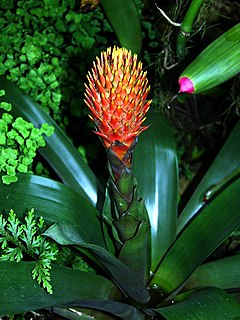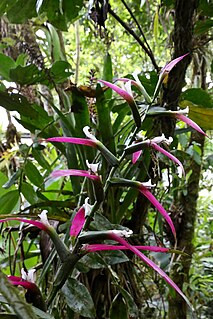
Guzmania lingulata, the droophead tufted airplant or scarlet star, is a species of flowering plant in the family Bromeliaceae, subfamily Tillandsioideae, native to rainforest habitats in Central America, northern and central South America, southern Mexico and the West Indies. It is an evergreen epiphytic perennial. The Latin word lingulata means "tongue-shaped". Foliage grows in a star-shaped basal rosette which culminates in an orange and red bracted inflorescence. It is among the most commonly cultivated bromeliad types, with cultivars producing flowers in shades of maroon, red, orange, yellow or pink.

Guzmania sanguinea is a species of plant in the family Bromeliaceae. This species is native to Trinidad and Tobago, Costa Rica, Panama, Colombia, Venezuela, Ecuador, and northern Brazil.

Guzmania monostachia is an epiphytic species in the genus Guzmania. Also known as a West Indian tufted airplant, this species is native to South America, Central America, the West Indies and Florida. The species is also reportedly naturalized in Hawaii.
Guzmania acuminata is a plant species in the genus Guzmania. This species is native to Ecuador and Colombia.
Guzmania besseae is a plant species in the genus Guzmania. This species is native to Bolivia and Ecuador.
Guzmania bicolor is a plant species in the genus Guzmania. This species is native to Ecuador and Colombia.
Guzmania claviformis is a plant species in the genus Guzmania. This species is native to Ecuador and Peru.
Guzmania confusa is a plant species in the genus Guzmania. This species is native to Ecuador and Colombia. Two varieties are recognized:
- Guzmania confusa var. confusa - Colombia
- Guzmania confusa var. foetidaRauh - Ecuador

Guzmania conifera is a species of flowering plant in the Bromeliaceae family. It is native to Ecuador and Peru.
Guzmania danielii is a plant species in the genus Guzmania. This species is native to Bolivia and Ecuador.
Guzmania donnellsmithii is a plant species in the genus Guzmania. This species is native to Costa Rica, Panama, Nicaragua, and Ecuador.

Guzmania eduardi is a plant species in the genus Guzmania. This species is native to Ecuador and Colombia.
Guzmania morreniana is a plant species in the genus Guzmania. This species is native to Bolivia and Ecuador.
Guzmania paniculata is a plant species in the genus Guzmania. This species is native to Ecuador and Peru.
Guzmania scherzeriana is a plant species in the genus Guzmania. This species is native to Central America, Colombia and Ecuador.
Guzmania sibundoyorum is a plant species in the genus Guzmania. This species is native to Ecuador and Colombia.

Guzmania squarrosa is a plant species in the genus Guzmania. This species is native to Bolivia, Guyana, Colombia, Venezuela, Peru, and Ecuador.
Guzmania testudinis is a plant species in the genus Guzmania. This species is native to Ecuador and Colombia.
Guzmania undulatobracteata is a plant species in the genus Guzmania. This species is native to Peru, Bolivia, and Ecuador.

Guzmania wittmackii is a species of flowering plant in the Bromeliaceae family. It is native to Ecuador and Colombia, and widely cultivated elsewhere as an ornamental.






